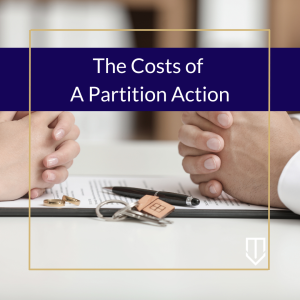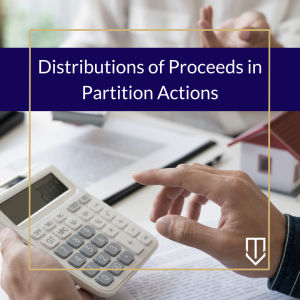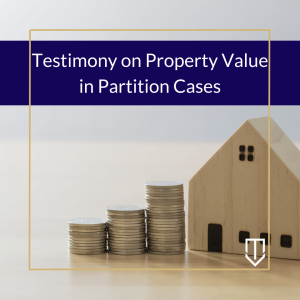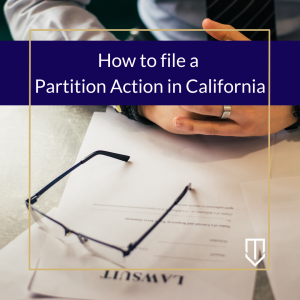 The purpose of this blog post is to discuss who must be named in a partition lawsuit. It is important to name all the necessary parties so that the Court can properly issue a judgment at the conclusion of the partition action. As partition lawsuits involve rights to property, it is pretty obvious that the owners of the property and the mortgage broker should be joined. But the question becomes more difficult as the interests become less connected, like easement holders or other persons who have liens against the individual owners. As such, this article aims to provide clarity on the process.
The purpose of this blog post is to discuss who must be named in a partition lawsuit. It is important to name all the necessary parties so that the Court can properly issue a judgment at the conclusion of the partition action. As partition lawsuits involve rights to property, it is pretty obvious that the owners of the property and the mortgage broker should be joined. But the question becomes more difficult as the interests become less connected, like easement holders or other persons who have liens against the individual owners. As such, this article aims to provide clarity on the process.
What Does the Law Say?
Under Code of Civil Procedure section 872.510, the plaintiff must join as defendants all persons having or claiming interests in the estate, persons who are actually known to the plaintiff to have such interests, or persons who, from an inspection of the property, appear to have such interests. Sections 872.510 to 872.550 define “interest,” as situations, includes liens, and a “lien” means a mortgage, deed of trust, or other security interest in property whether arising from contract, statute, common law, or equity. According to the Legislative Committee Comment, under Section 872.510, only persons having interests in the estate or estates as to which partition is sought need to be joined.
 California Partition Law Blog
California Partition Law Blog


 The purpose of this article is to explain a partition sale and who must be notified of a sale. If the co-owners cannot agree about what to do with a property or whether they want to sell it, a partition action may be necessary. This means forcing the sale of the property to divide the co-owners’ interests in it and divide the value of the property accordingly. Because a home or property cannot necessarily be
The purpose of this article is to explain a partition sale and who must be notified of a sale. If the co-owners cannot agree about what to do with a property or whether they want to sell it, a partition action may be necessary. This means forcing the sale of the property to divide the co-owners’ interests in it and divide the value of the property accordingly. Because a home or property cannot necessarily be  In every lawsuit, one of the biggest consideration is the cost. Frequently, clients are very eager to understand the amount that they will be required to pay to have their case resolved. After all, most people do not have a pot of money set aside for lawsuits, and are forced to eat into their savings to pay for an attorney to help with their legal problems. Even when attorneys’ fees are available for reimbursement, as they are in a partition action, the question of costs is always a significant question.
In every lawsuit, one of the biggest consideration is the cost. Frequently, clients are very eager to understand the amount that they will be required to pay to have their case resolved. After all, most people do not have a pot of money set aside for lawsuits, and are forced to eat into their savings to pay for an attorney to help with their legal problems. Even when attorneys’ fees are available for reimbursement, as they are in a partition action, the question of costs is always a significant question. Before the owners receive the proceeds from a partition sale, costs and expenses related to the
Before the owners receive the proceeds from a partition sale, costs and expenses related to the  The estimated value of a piece of property can be important for resolving several types of legal disputes. It is crucial when a property owner needs to establish damages when the government interferes with the owner’s property and diminishes its value. Spouses may wish to testify regarding the value of their marital property when it is divided during divorce proceedings. A property owner may also want to testify as to their property’s value to contest a bank’s foreclosure on the property.
The estimated value of a piece of property can be important for resolving several types of legal disputes. It is crucial when a property owner needs to establish damages when the government interferes with the owner’s property and diminishes its value. Spouses may wish to testify regarding the value of their marital property when it is divided during divorce proceedings. A property owner may also want to testify as to their property’s value to contest a bank’s foreclosure on the property. When co-owners of real estate cannot agree on how to divide or use their property, filing a
When co-owners of real estate cannot agree on how to divide or use their property, filing a  A trust is a legal device often used in estate planning. A trust may be established in the trustor’s lifetime, or it may be established in the trustor’s will where it takes effect once the trustor dies and the will is admitted in probate. Generally, assets in a trust are distributed according to the trustor’s intent, which can be specified in the trust instrument or document.
A trust is a legal device often used in estate planning. A trust may be established in the trustor’s lifetime, or it may be established in the trustor’s will where it takes effect once the trustor dies and the will is admitted in probate. Generally, assets in a trust are distributed according to the trustor’s intent, which can be specified in the trust instrument or document. Relationships are hard, and real estate relationships are even harder. People can own real estate, called “holding title,” in many different ways. One of the more common ways that non-married couples hold title to real estate is as a joint tenant. And one of the core features of a joint tenancy is a “right of survivorship,” which means that if one of the owners dies, then the other ones inherit their shares automatically without the need for the probate process.
Relationships are hard, and real estate relationships are even harder. People can own real estate, called “holding title,” in many different ways. One of the more common ways that non-married couples hold title to real estate is as a joint tenant. And one of the core features of a joint tenancy is a “right of survivorship,” which means that if one of the owners dies, then the other ones inherit their shares automatically without the need for the probate process. Real property partitions help co-owners and co-tenants divide real estate that they purchased together.
Real property partitions help co-owners and co-tenants divide real estate that they purchased together.